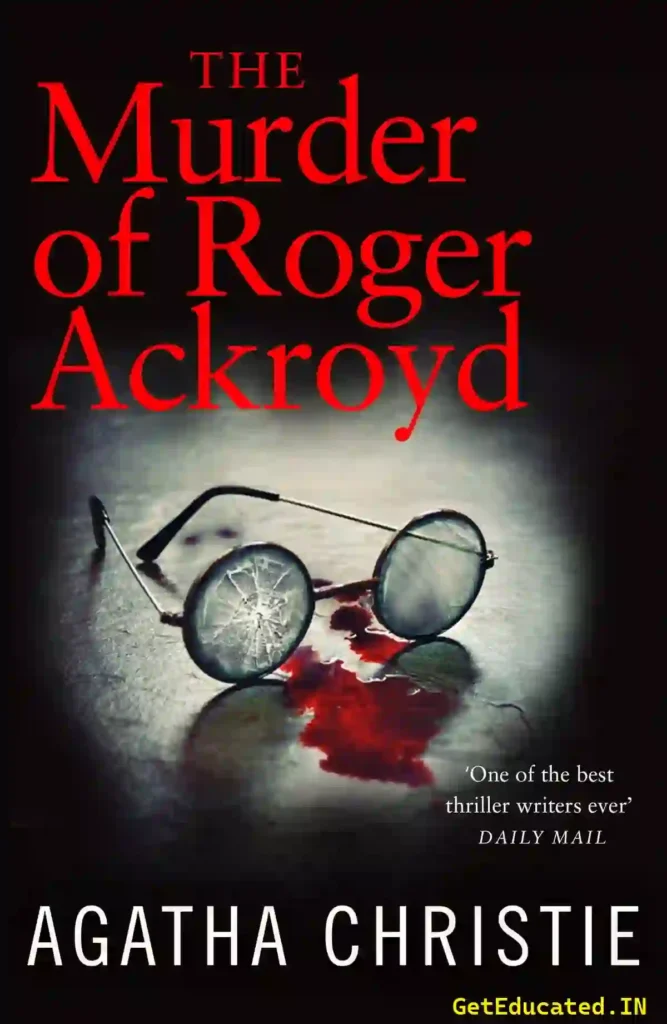
The narrator of Christie’s The Murder of Roger Ackroyd is Doctor James Sheppard. There is no introduction of Sheppard in the beginning of the novel but the reader finds out more about him as the story develops. He has a sister named Caroline Sheppard, who is really good at tapping into the gossip and finding out what happens in the little village where they live (10). The reader also learn that Dr. Sheppard’s hobby is gardening (32), tinkering with small technical devices (291) and playing Mah Jong (233). During the major part of the narrative, except in the last two chapters, Dr. Sheppard is a very respectable character. The other characters in the novel describe and treat him with respect. He enjoys a high degree of trust from all the other characters, and a good social standing in the community.
In the novel The Murder of Roger Ackroyd, written by Agatha Christie, revolves around the murder case of Mr. Roger Ackroyd. This mystery is told from the point of view of Dr. James Sheppard, who is also the assistant of the retired detective, Mr. Hercule Poirot, who investigates the central murder. Through out the novel, Agatha Christie uses the literary device of the unreliable narrator, which is a device in which the credibility of the narrator is seriously compromised. In this case, Dr. Sheppard is the compromised narrator because he is very biased as to who he suspects committed the crime.
At the beginning of the novel we read that as Dr. Sheppard went to talk to Mr. Ackroyd about Ackroyd’s lover being blackmailed. As they talk in Mr. Ackroyd’s study, John Parker, Mr. Ackroyd’s butler, enters the room with some letters. “The letters were brought in at twenty minutes to nine. It was just on ten minutes to nine when I left him, the letter still unread. I hesitated with my hand on the door handle, looking back and wondering if there was anything I had left undone” (Christie, 37). What is clear to us when after reading the novel is that Dr. Sheppard, the unreliable narrator, left out 10 minutes of information, from the time the letters arrive, to when he is exiting the study. He isn’t necessarily lying to us; he is just hiding the truth from the text by omission, or evasion. We are left to wonder what exactly happened in those 10 minutes that were left blanked?
Dr. Sheppard narrates the story in first person meaning that the information about the events and investigation are focalized through him. Readers with some knowledge of literature theory will know that a first person narrator raises issues of trustworthiness. The two following scenes exemplify Dr. Sheppard’s deception. They are from the second and first chapter in the novel. The reader could not be expected to have any knowledge of the characters in the novel. In the following scene, Dr. Sheppard shares some of his thoughts about the death of Mrs. Ferrars (the widow who Dr. ‘Sheppard has been blackmailing, which is not revealed to the reader until the end), before Roger Ackroyd is murdered.
Dr. Sheppard’s voice dominates the whole narrative, but sometimes in a very discreet way. The domination of the narrative is of course an active choice from the author, which in turn enables the self-conscious narrator to deceive the reader. Some parts of the narration take place through Dr. Sheppard’s description of his thoughts and ideas. In other parts he merely documents conversations that take place between other characters, without commenting on them. He also describes events that he takes part in.
It is interesting to note that Christie’s choice of occupation for Dr. Sheppard coincides with the level of attention to detail and precision that it would take to create the concealment in the narration. A doctor is usually associated with attention to detail and a certain capacity of the mind. This is required when omitting so much information in such a clever way, which Dr. Sheppard is doing. Having established and shown textual support for the argument that Dr. Sheppard is a self-consciously unreliable narrator as Yacobi defined it, it is important to remember that this is a conscious choice from the author.
There is also another similar incident shortly after that. When Dr. Sheppard is making his way out of Mr. Ackroyd’s property, he bumps into a man that he has never seen before outside the gates of Fernly Park. We as the reader can later assume that this man could have been the killer. What makes this very unreliable is that Dr. Sheppard is the only one who saw this man outside the home, which makes us question if there was truly someone outside the gates. This, although, doesn’t mean that he is in fact lying to us, like before he is just leaving information out. Therefore, he might have seen a man outside the gates of the park, but he just simply left out crucial evidence, and therefore leading the investigation towards the man and away from the real killer, himself.
Another aspect that the unreliable narrator omits is his own guilt and inner thoughts. Schaik (2015) claims that a narrator’s most personal thoughts reveal their “true nature”. He continues saying that, in Dr. Sheppard’s case, he simply expresses his dislike for some characters. Sheppard plainly paraphrases other characters’ statement or directly quotes them. Nonetheless, he never comments on any of Poirot’s findings to solve the case or even discloses anything about his emotions and feelings. His lack of involvement, even within the scope of his own private thoughts, should’ve been an indicator of his culpability to the meticulousreader. The omission of sentiments is based on the fact that he cannot expose his guilt and regret to the ignorant audience.
In the novel The Murder of Roger Ackroyd, written by Agatha Christie, revolves around the murder case of Mr. Roger Ackroyd. Agatha Christie did something amazing with this novel and that is that she did not only a skillful first person narrative of a killer who pretends he’s an innocent bystander, but she also made Dr. Sheppard an active participant in finding the solution. Christie employs a previously uncommon narrative technique that breaks the traditional and accepted norms of a detective story. She creates an unreliable narrator that can only be spotted when contrasted with a reliable one, Hercule Poirot. Christie’s genius lies in the consistency of her narration, which enables her to fool her audience and give them a false sense of understanding and security.

[…] The narrator of Christie’s The Murder of Roger Ackroyd is Doctor James Sheppard. There is no introduction of Sheppard in the beginning of the novel but the reader finds out more about him as the story develops. He has a sister named Caroline Sheppard, who is really good at tapping into the gossip and finding out what happens in the little village where they live (10). The reader also learn that Dr. Sheppard’s hobby is gardening (32), tinkering with small technical devices (291) and playing Mah Jong (233). During the major part of the narrative, except in the last two chapters, Dr. Sheppard is a very respectable character. The other characters in the novel describe and treat him with respect. He enjoys a high degree of trust from all the other characters, and a good social standing in the community. … (Read More) […]